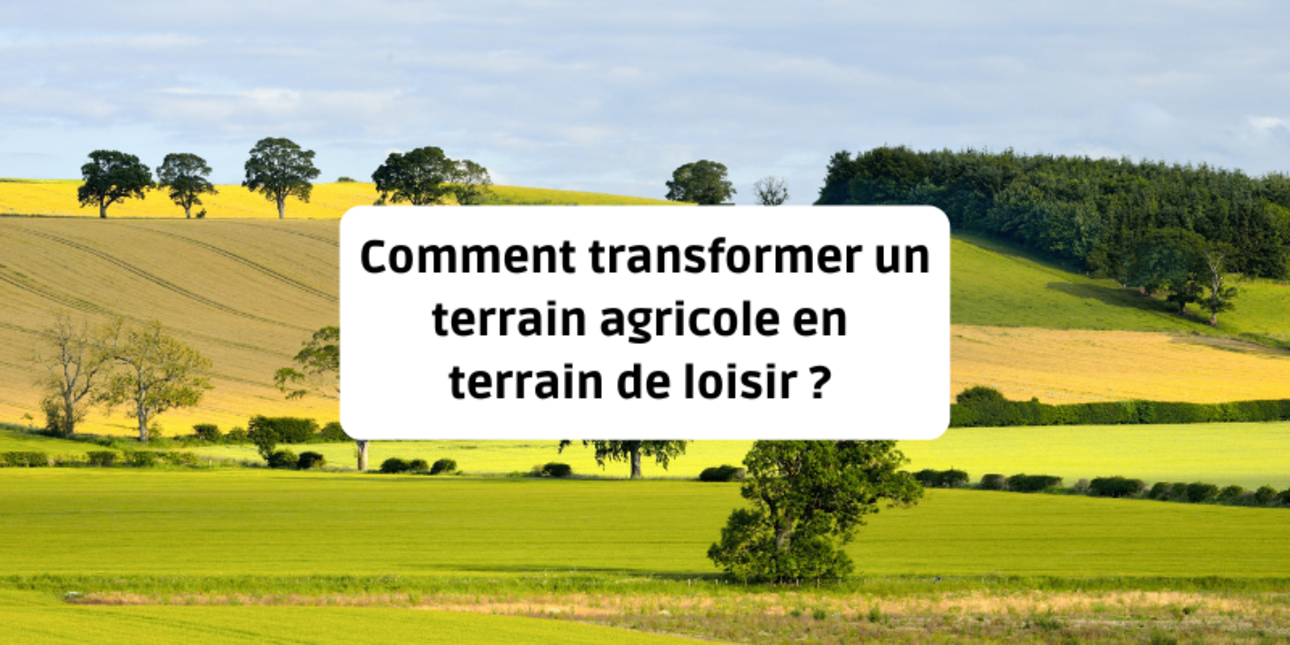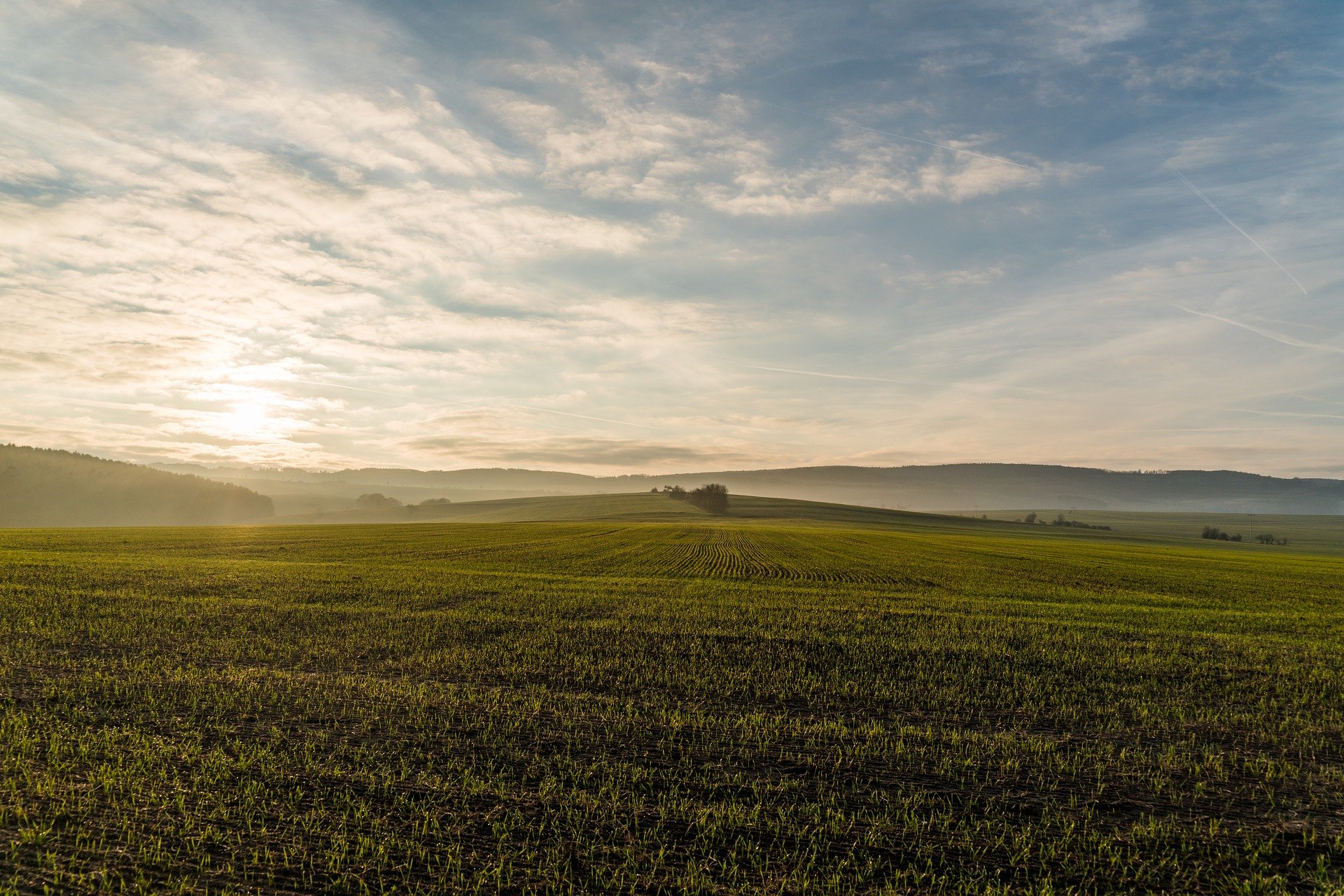
Updated February 26, 2025
Buying land to grow your own vegetable patch, create a lush garden, fish by your own pond, camp out, sleep in your own tree house for a few nights or simply enjoy the peace and quiet of nature is the dream of many owners or future owners.
But converting agricultural land into a recreational area requires a thorough understanding of current legal and environmental constraints. Contrary to popular belief, this transformation does not require any administrative formalities, since it is the use made of the land that determines its classification as “leisure land”. However, PLU (Plan Local d'Urbanisem) regulations, the new ZAN (Zéro Artificialisation Nette) directives and the risk of SAFER pre-emption require in-depth strategic consideration.
This updated guide incorporates the latest legislative developments and feedback from planning departments to maximize your project's chances of success.
Agricultural zones (A) include plots of land that are biologically, agronomically, economically and landscape rich, and where the land must be reserved for farming.
Agricultural land may also be classified as an N zone for sensitive natural areas.

Leisure areas (AUL) are intended for sports, cultural and leisure activities (sports grounds, campsites, residential leisure parks, etc.).
There are therefore no specific town planning regulations for privately-owned leisure land outside this AUL zone.
The official definition of this type of land can therefore be the one made by the Ministry of Housing and Territorial Equality as part of a ministerial response dated 15 May 2014: "The designation of "leisure land" is a matter of usage and not a legal category in the town planning code. It results, in fact, from the activity of camping, which leads to the installation of leisure accommodation on private plots located in non-constructible, natural or agricultural areas."
The French town planning code does not officially recognize the “terrain de loisir” category. This designation relates exclusively to private use, theoretically allowing transformation without any particular formality. Nevertheless, classification as an A (agricultural) or N (natural) zone strictly determines development possibilities.
The good news is that it's the use you make of a piece of farmland or woodland that makes it a leisure site, not a legal classification.
Recreational land is generally non-buildable land located in agricultural (A) or natural (N) zones. There are no special administrative formalities involved in converting agricultural land into a leisure site.
Although you are free to camp on the land, it will be more complicated to install a caravan or light construction. You are not free to do what you want on your land.
Prior to any purchase, it is essential to consult the PLU, POS (Plan d'Occupation des Sols) or carte communale. Since 2024, municipal planning departments have been using an online simulation tool to assess the theoretical constructability of plots.
| Zone | Authorized use | Construction | Length of occupancy |
| A (Agricole) | Vegetable garden, temporary camping | HLL only | |
| N (Naturelle) | Hiking, fishing | Unlimited | |
| AUL (Loisirs) | Organized camping | 6 months/year |
*Subject to municipal authorization and compliance with HLL standards.
Buildings in agricultural (A) and natural (N) zones are strictly regulated, so you won't be free to set up a house or cabin there. This is what we explained in our articles on building on agricultural or forest land.
Only a farmer can, under certain conditions, obtain permission to build a dwelling on agricultural land.
Zones A and N may include STECAL zones (Secteur de Taille Et de Capacité d'Accueil Limitée) in which light constructions may be authorized, but very few communes have included these zones in their Local Urban Plans.
The 2023 reform introduces a simplified declaration system for installations smaller than 35 m². The application must include :
Although connection to the electricity, water and sewerage networks is not compulsory, applicants for the installation of a Habitat Léger de Loisir must enclose with their application “a certificate attesting to compliance with health and safety regulations, in particular fire safety regulations, as well as the conditions under which the occupants' water, sewerage and electricity needs are met” (article R 441-6-1 of the French town planning code).
Instruction times vary from 2 to 6 months depending on the department. A recent case (TA de Bordeaux, January 2025) confirmed the ban on permanent installation in zone A, even for micro-habitations.
Note that since 2024, administrative jurisprudence has considered that occupancy of more than 120 days/year constitutes a principal residence, leading to prosecution for illegal occupation. In December 2024, a prefectoral decree in Loire-Atlantique ordered the destruction of 23 cabanes on this ground.
In practice, before setting up a caravan, mobile home or light dwelling, building a cabin, ... contact the town hall to find out what you're allowed to do. Otherwise, you run the risk of having to dismantle your installation.
From a town-planning point of view, there are different types of recreational housing, and the regulations governing mobile homes and caravans are different:
|
|
Definition in the French Planning Code |
Example |
| Light leisure accommodation - HLL | Demountable or transportable structures intended for temporary or seasonal occupation for leisure purposes. | Chalets, bungalows, cabins, tiny houses or maisonnettes, tree houses, yurts and tipis (equipped with kitchen or bathroom facilities). |
| Mobile leisure home - RML | Inhabitable land vehicles intended for temporary or seasonal occupation for leisure purposes, which retain the means of mobility enabling them to be moved by traction, but which the Highway Code prohibits from being driven. |
Mobil home |
| Caravan | Inhabitable land vehicles intended for temporary or seasonal occupation for leisure purposes, which permanently retain the means of mobility enabling them to move by themselves or to be moved by traction, and which the Highway Code does not prohibit from being driven. | Caravans, vans, motorhomes (better known as motorhomes). |
As mobile homes and caravans do not fall into the HLL category, they cannot be installed, even temporarily, on agricultural land, unless an exemption is granted by the local council.
Create a pond and spend your weekends fishing. This is the dream of many anglers, but it's a dream that's difficult to achieve because the regulations governing the creation of a pond are highly restrictive.
The creation of a pond has an impact on the aquatic environment, on the flow of water in the catchment area, and can have implications in terms of public safety.
The creation and maintenance of ponds are therefore subject to regulatory obligations (articles L.214-1 to L.214-6 of the French Environment Code), and require prior authorisation (declaration under 100 m² or authorisation over 100 m²).
Pond creation is now subject to :
Buying land with a water feature is quick and easy. But don't forget to check that it complies with the law. This is mandatory for any pond or water body created after March 29, 1993. A declaration procedure can be used to regularize water bodies created before this date.
To make your plot of land suitable for building and obtain planning permission for purposes other than agriculture or low-cost housing, you will need to obtain a zoning change (or declassification): i.e. have the Local Urban Planning Scheme (PLU) amended to declassify the agricultural (A) or natural (N) plot as suitable for building (classification U in the PLU). This downgrading can be carried out when the PLU is being drafted or revised.
We advise you to contact the town planning department at your local council to present the arguments for downgrading your land and to find out when a revision might be considered.
If your plot of land was previously classified as zone U and the Local Plan has been amended to change its classification to zone A or N, it is possible to challenge this classification before the courts.
Good to know: Recent changes introduced by the Climate and Resilience Act (2021) reinforce the protection of agricultural areas. For example, consolidated data from the Normandy Chamber of Agriculture (2024) show a majority rejection of downgrading requests, in line with the national ZAN objective, with rates exceeding 70% in areas under urban pressure.

The purchase of agricultural land or woodland is unrestricted. However, like any sale, it may be subject to a right of pre-emption, including that of the SAFER.
If you are in an area where land is in short supply, there is a fairly high risk that the SAFER will pre-empt the purchase of a plot of land to be used for leisure purposes, especially if the purchase price is much higher than the average market price.
It should be noted, however, that the SAFER only has this power of pre-emption over forestry plots in special cases:
Don't hesitate to contact SAFER beforehand to find out whether your project is feasible.
Unless you have agricultural status, you will not be able to create a main dwelling on your leisure site. The best you can do is set up a light leisure dwelling for a maximum of 3 months a year.
You can create a pond, but you will need to comply with strict formalities. In this case, it may be simpler to buy a plot of land where a pond already exists.
Apart from these 2 situations, it's actually very simple to convert agricultural land into recreational land: there are no administrative formalities to complete, as it's the use you make of it that makes it recreational land.
However, you run the risk of being pre-empted by the SAFER if you are in competition with farmers.
To ensure the security of your project, we advise you to contact the local council before committing yourself to a purchase.